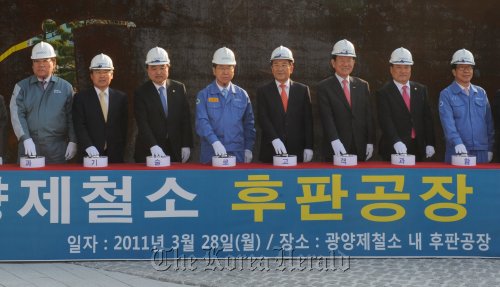POSCO completed a new thick-plate producing facility within its steelworks in Gwangyang, South Jeolla Province, on Monday.
The new plant has an annual production capacity of 2 million metric tons, pushing up POSCO’s total thick-plate production capacity to 7 million tons. Thick-plates are hot-rolled products that are thicker than 6 millimeters used in a variety of products including ships and industrial machinery.
With the changes, POSCO now has the world’s largest thick-plate production capacity.
Up until now, Japan’s JFE Steel Corp. had the largest production capacity with 5.2 million tons, followed by Nippon Steel Corp. with 4.8 million tons.
 |
POSCO CEO Chung Joon-yang (fourth from left), South Jeolla Province Governor Park Joon-yung (fifth from left), Vice Minister of Knowledge Economy Ahn Hyun-ho (third from left) and other participants open POSCO’s new thick-plate plant at the Gwangyang Steelworks in Gwangyang, South Jeolla Province, Monday. (POSCO) |
In addition to boosting POSCO’s production capacity, the new plant is capable of producing thick-plates at a width of up to 5.3 meters, the company said.
According to POSCO officials, commonly available thick-plates are of narrower in width, requiring plates to be welded together to cover wider areas. As such, the company said that its new wider plates will enable consumers of such products to improve productivity and lower production costs.
The steelmaker also said that the new plant will also reduce imports of thick-plates. According to POSCO, Korea’s thick-plate consumption came in at 11 million tons last year, requiring 4 million tons to be imported.
With the new plant going online, however, the company estimates that annual imports can be reduced by 2.7 million tons or nearly 1 trillion won ($897 million).
The company also said that the new plant will contribute to reducing the effects of materials-shortages caused by the earthquake in Japan on local shipbuilders and heavy industries companies that rely partly on Japanese steelmakers for thick-plates.
By Choi He-suk (
cheesuk@heraldcorp.com)








